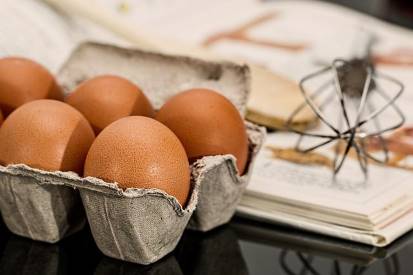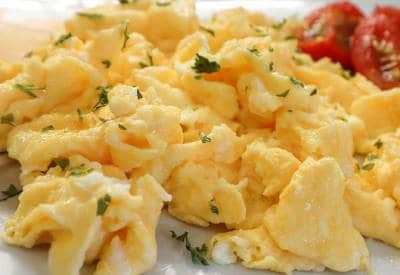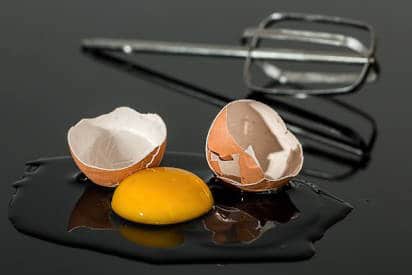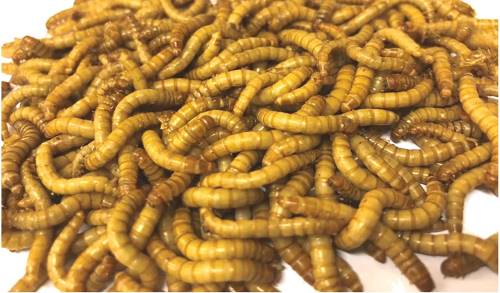If you’ve ever found yourself staring at your flock of chickens, clutching a basket full of eggs, you might have wondered, can chickens eat eggs? If so, you’re not alone. It’s a surprisingly common question among poultry enthusiasts and backyard chicken keepers. And the straightforward answer is yes, chickens can eat eggs.
This may initially seem odd or counterintuitive, given that eggs are their produce. Yet, chickens are naturally omnivorous and can eat a wide variety of foods, including eggs. Feeding eggs to chickens isn’t without complications. It requires caution to avoid instigating egg-eating behavior and to maintain a balanced diet for your flock. It’s a nuanced subject that warrants a closer look.
This article will delve deep into the intricacies of a chicken’s diet, particularly focusing on eggs. We’ll explore the pros and cons, the right way to feed eggs, how to handle egg-eating habits in your flock, and alternative protein sources if you decide that feeding eggs to your chickens isn’t for you. Whether you’re a seasoned chicken keeper or a newcomer to the coop, I’m confident you’ll find this exploration enlightening and practical.

Understanding the Chicken’s Diet
Ah, the humble chicken. If you’re raising these feathery friends, you know how vital their diet is to their overall health and egg production.
Overview of a Chicken’s Natural Diet
In the wild, chickens are omnivores, meaning they munch on various foods – from seeds and insects to small rodents and greenery. This array of nutrients helps keep them healthy and lays the foundation for quality egg production.
The Role of Protein in a Chicken’s Diet
Protein is a major player in a chicken’s diet. It’s critical for growth, feather development, and, of course, egg production. If a chicken doesn’t get enough protein, it can reduce egg output and even loss of feathers.
Importance of Variety and Balance in a Chicken’s Feed
While protein is a biggie, it’s not the be-all and end-all. Chickens need a balanced diet that includes carbohydrates, vitamins, and minerals. A varied diet can also help prevent boredom and pecking among the flock.
[ChickenAffiliate]
Can Chickens Eat Eggs?
This might seem a little odd. Can chickens eat eggs? Let’s dive in and find out.
Historical Context and Instances of Chickens Eating Eggs
Chickens eating eggs isn’t a new phenomenon. It’s fairly common in the wild, where chickens often eat the remains of hatched eggs to reclaim vital nutrients.
The Nutritional Value of Eggs for Chickens
Eggs pack a protein punch, which we know benefits our feathery friends. They also contain essential vitamins and minerals, like Vitamin D and calcium, which contribute to the chicken’s overall health and the strength of the eggshells they produce.
Possible Health Implications of Chickens Eating Eggs
While eggs can be a healthy part of a chicken’s diet, there can be some downsides. Overfeeding eggs, particularly raw ones, can lead to an excess of certain nutrients, which can throw a chicken’s diet out of balance.
The Pros and Cons of Feeding Chickens Eggs

Feeding chickens eggs can be a bit of a hot-button topic. Let’s take a look at the upsides and potential pitfalls.
Benefits of Eggs as a Source of Protein
Eggs are protein powerhouses, and feeding them to chickens can boost their protein intake significantly. This is especially beneficial during molting periods when chickens need extra protein to regrow their feathers.
Risks Associated with Overfeeding Eggs
On the flip side, overfeeding eggs can lead to an oversupply of nutrients like vitamins A and D, which can cause health issues. Feeding raw eggs may encourage chickens to start eating their own freshly laid eggs – a habit that’s tough to break.
Potential for Encouraging Egg-Eating Behavior
This is a biggie. Once a chicken gets a taste for eggs, it might start seeing its eggs (and those of its flock mates) as a food source. That’s a recipe for a drop in egg production.
Proper Ways to Feed Eggs to Chickens

So, if you decide to feed your chickens eggs, it’s important to do it correctly.
Preparing Eggs for Chickens
Boiling or scrambling eggs is the best way to serve them to your chickens. It makes the eggs easy to eat and disguises them, reducing the chance of chickens associating the food with their freshly laid eggs.
Incorporating Eggs into Other Chicken Feed
Mixing cooked eggs into your chickens’ regular feed can also be a good strategy. This further camouflages the eggs and ensures they’re being eaten in a balanced diet.
How Often to Feed Chickens Eggs
Remember, moderation is key. Aim to feed eggs as an occasional treat or supplement rather than a mainstay of your chickens’ diet. Once or twice a week should do the trick.
Troubleshooting Egg-Eating in Your Flock

Now, what if you’ve got an egg-eating chicken on your hands? Don’t worry; there are ways to manage this.
Identifying Egg-Eating Behavior in Chickens
You might have an egg-eating chicken if you notice fewer eggs, broken eggs, or egg residue in the nesting boxes. The chicken may also have egg residue on its beak or face, another giveaway.
Strategies to Deter Egg-Eating Habits
To deter this habit, make sure your chickens are getting enough to eat and have enough to do. Bored, hungry chickens are more likely to start snacking on eggs. Also, collect eggs frequently to minimize temptation, and consider darkening the nesting areas – chickens are less likely to eat what they can’t see!
What to Do if Your Chickens Won’t Stop Eating Their Eggs
If all else fails, there are products on the market designed to discourage egg eating. You can also try filling an empty eggshell with something unpleasant, like mustard, which can deter the habit.
Alternatives to Feeding Chickens Eggs

Finally, if you’re looking for other ways to boost your chickens’ protein intake without resorting to eggs, there are plenty of options.
Other Protein-Rich Foods Safe for Chickens
Think insects, mealworms, or even small amounts of meat or fish. These can all provide a protein punch. Just remember to feed in moderation.
Implementing a Diverse, Balanced Diet for Your Chickens
In addition to proteins, ensure your chickens get a mix of grains, vegetables, and other nutrients. A varied diet can help ensure your chickens stay healthy and keep laying those beautiful eggs.
Considerations When Choosing Alternative Feeds
When exploring alternatives, consider the nutritional value, cost, and how readily available the feed is. It’s also important to ensure any food you offer is safe for chickens – some foods can be harmful or even toxic to our feathered friends.
Further Egg Considerations for Chicken Keepers
There are a few additional considerations when it comes to feeding eggs to your chickens.
Eggshells as a Calcium Source
Interestingly, not only the inside of an egg can be nutritious for chickens but the eggshell as well. Eggshells are an excellent source of calcium, which is crucial for chickens to produce strong eggshells of their own. However, like feeding eggs, you should also crush the shells before feeding to avoid teaching chickens that their eggs are a food source.
Commercially Available Chicken Feed and Eggs
Many commercially available chicken feeds are designed to provide a balanced diet, including adequate protein. Hence, if you’re feeding your chickens high-quality commercial feed, adding eggs or other protein sources may not be necessary. However, additional protein from sources like eggs can be beneficial during certain times, such as molting.
Incorporating Eggs into Homemade Chicken Feed
Eggs (particularly cooked ones) can be an excellent addition if you’re making homemade chicken feed. You can incorporate them as a protein source along with grains, seeds, and vegetables to ensure a balanced diet.
What Other Dairy Products Can Chickens Eat Apart from Eggs?

Beyond eggs, you might consider a whole world of dairy products for your chickens’ dietary needs. Here, we’ll look closely at five common dairy products to determine their suitability for your feathered friends.
Cheese
While cheese can be a source of protein and calcium, it’s important to feed it to your chickens in moderation due to its high fat and salt content. Small amounts of cheese can be a tasty treat for your chickens, but ensure it’s not moldy or overly processed.
Read More: Can Chickens Eat Cheese? The Surprising Answer And More
Yogurt
Yogurt is generally a great choice for chickens. It’s rich in protein and calcium and contains probiotics that aid digestion. However, it should be served as an occasional treat rather than a dietary staple. Too much dairy can cause digestive issues in chickens as they are not naturally equipped to process large amounts of lactose.
Read More: Can Chickens Eat Yogurt? Unveiling The Benefits And Risks
Cottage Cheese
Like yogurt, cottage cheese can provide a healthy dose of protein and calcium. The lower fat content compared to other cheeses makes it a better choice. However, like other dairy products, it should be offered sparingly to avoid upsetting your chickens’ digestive systems.
Read More: Can Chickens Eat Cottage Cheese? Unraveling The Truth
Ice Cream
While the idea of chickens pecking at an ice cream cone is certainly amusing, ice cream is not the best food for your flock. It’s high in sugar and lactose, which chickens can’t efficiently process. A very small amount on a hot day might be okay, but avoiding ice cream in your chickens’ diet is generally best.
Read More: Can Chickens Eat Ice Cream? Debunking Myths & Healthy Alternatives
Sour Cream
Sour cream, like other dairy products, can be a source of protein and calcium, but it also has a high fat content. Additionally, its rich consistency may be difficult for chickens to digest. It’s best to keep this as a rare treat, if at all, in your chicken’s diet.
Read More: Can Chickens Eat Sour Cream? Unraveling The Dairy Dilemma
Can chickens eat eggs – final thoughts
And there you have it, the whole egg-sperience of chickens eating eggs! To crack this shell again, yes, chickens can eat eggs. They offer a protein-packed treat that can benefit your flock’s health and egg production. However, serving eggs to chickens requires a sprinkle of caution to avoid encouraging those pesky egg-eating habits.
Navigating the poultry diet world can feel like walking on eggshells. But with the right balance, careful preparation, and a keen eye for egg-eating behavior, you’ll have a flock clucking with health and happiness. And if eggs aren’t your chicken’s cup of feed? No worries! There’s a whole barn full of protein-rich alternatives for your feathered friends.
